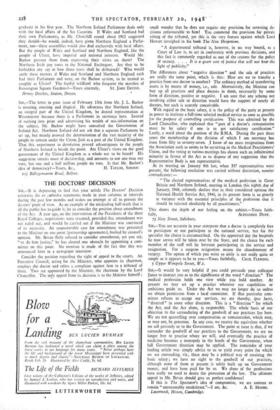THE DOCTORS' DECISION
sm,--It is depressing to find that your article The Doctors' Decision reiterates the ex cathedra statements made in your columns at intervals during the past few months and makes no attempt at all to present the doctors' point of view. As an example of the misleading half-truth that is all the public has to guide it, let us consider the position about amendment of the Act. A year ago, on the intervention of the Presidents of the three Royal Colleges, negotiations were resumed, provided that amendment was not ruled out, and would be carried out if the Minister was convinced of its necessity. An unanswerable case for amendment was presented to the Minister on one point (partnership agreements), backed by counsel's opinion. Mr. Bevan flatly refused to consider amendment, yet you say, " to do him justice," he has cleared one obstacle by appointing a com- mittee on this point. No mention is made of the fact that this was
announced later in a newspaper interview. .
Consider the position regarding the right of appeal to the courts. An Executive Council, acting for the Minister, who appoints its chairman, employs the doctor and refers a complaint against him to a tribunal of three. Two are appointed by the Minister, the chairman by the Lord Chancellor. The only appeal from its decision is to the Minister himself ;
small wonder that he does not require any provision for reversing de- cisions unfavourable to him! You commend the provision for private sitting of the tribunal, yet this is the very feature against which Lord Hewart inveighed in his book The New Despotism.
" A departmental tribunal is, however, in no way bound, as a Court of Law is, to act in conformity with previous decisions, and this fact is commonly regarded as one of the reasons for the policy of secrecy. . . . It is a queer sort of justice that will not bear the light of publicity."
The differences about " negative direction " and the sale of practices are really the same point, which is this: How are we to transfer a practice from one doctor to another? The ordinary method of transferring assets is by means of money, i.e., sale. Alternatively, the Minister can buy up all practices and place doctors in them, necessarily by some form of direction, positive or negative. I am sure that any scheme not involving either sale or direction would have the support of nearly all doctors, but such is scarcely conceivable.
With regard to the basic salary, it is the policy of the party at present in power to institute a full-time salaried medical service as soon as possible for the purpose of controlling certification. This was admitted by the Lord Chancellor, who explained that " part of a doctor's remuneration must be by salary if one is to get satisfactory certification." Lastly, a word about the position of the B.M.A. During the past three years the membership of the division of which I am secretary has risen from fifty to seventy-seven. ,I know of no mass resignations from the Association such as seems to be occurring in the Medical Practitioners' Union, and the voting at various meetings has shown such an infinitesimal minority in favour of the Act as to dispose of any suggestion that the Representative Body is not representative.
At its meeting on January 8th last, when 337 representatives were present, the following resolution was carried without discussion, nemine contradicente: - - " The elected representatives of the medical profession in Great Britain and Northern Ireland, meeting in London this eighth day of January, 1948, solemnly declare that in their considered opinion the National -Health Service Act, 1946, in its present form is so grossly at variance with the essential principles of the profession that it should be rejected absolutely by all practitioners."
This shows the depth of our feeling on. the subject.—Yours faith-
75 New Street, Salisbury.






























 Previous page
Previous page